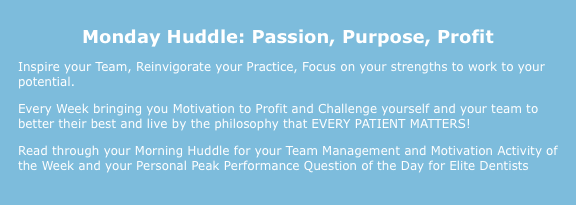Last week, we talked about telling and completing the whole story with your patients. Regardless of what role you play and position you are in, you have the ability to influence, persuade and encourage every person you see to move forward with whatever ‘next step’ that is in their very best interest.
In fact, that is actually the most important part of what you do. You may not think of it that way but it is 100% what you are there to do every single day… to influence patients to move forward with what you know is good for them.
So, if your primary responsibility every single day is to influence patients to do what you know is the right thing for them, how do you achieve that? Most often we think of EDUCATION and that is one key (albeit a very big and meaningful key) towards “influencing” someone.
You can also do it through examples, demonstrations and anything experiential. You do all of those things every day. Really, most of what we work on together boils down to this principle action of influence.
And while Education is very important, it does not mean that a patient values what they are being educated on so much so that they will buy into the solution and the benefits. Often times you need more than ‘just that.’
So today I’m going to arm you with five of the most valuable points of leverage that you have at your disposal to move your patients forward. They also happen to be both the easiest to use and the most under-utilized.
They are in essence statements or communication strategies that can be brought up to your patients when necessary. Some times that means bringing it up proactively and other times in response to patients’ delay, indecision, or objection to whatever you are encouraging them to do next.
This goes for over the phone to the case building to every clinical team member to the doctor’s exam and all the way through treatment presentation, asking for full payment to referrals and reviews.
All of these are very straightforward and only require your confidence to be willing and able to engage them.
More influence over your patients comes from…
#1 – Your Authority
That’s right. Because YOU SAID SO. You see more patients than the person who is sitting in front of you because they don’t see patients at all. You have the wisdom and experience to be their guide and from time to time you have to utilize your expertise and authority to remind them why they are there. This can be done tongue in cheek or blunt and straightforward.
#2 – The Truth
This is one of my favorites and we cover it nearly every week because it is the most important one. Simply saying to the patient that your “main responsibility today is to tell them the truth about what is going on, what it means, why it is happening and what the future holds based on what you see today.”
This is powerful and effective. It also happens to be extremely easy – just tell the truth.
#3 – Their Health
Yes, it is so simple. You must frequently remove the idea from the patients’ minds that anything is “optional” because we are not here to talk about “dentistry” or “money” or anything other than THEIR HEALTH. Once again, these do all link together because you are the expert and the truth doesn’t lie – the state of their health is what it is and it’s the only concern of the visit.
#4 – It’s About (and a matter of) Time
Yes said like that… it’s about time they get healthy, they fix this, they do something they deserve it, etc. But on the other hand, it is also simply a matter of time before something ‘gets worse’ or becomes an emergency (and much more painful and expensive).
Now your clinical philosophy and the actual reality of their mouths weighs into this, obviously. Maybe it truly is “elective” or “optional” (though I hate those words), but what matters is what is OPTIMAL.
Even still, whether it is ABOUT TIME or a MATTER OF TIME – what we know is that there is no time like right now, like the present. No patient has ever said, “I’m sure glad I waited,” instead they only and always say, “I wish I would have done this sooner.”
#5 – A Little Guilt Goes A Long Way
Okay, so for the bashful ones out there, if you are timid about helping your patients, or you don’t fully believe in what you are doing, then this one won’t sit well with you and that’s okay. I’m here for those that want to help as many patients as possible move forward with life changing care.
So here’s the deal, if you run into a tough situation you can play guilt a few ways.
First, you can say, “I know that the Doctor is going to be very disappointed about this and the fact that we did not do a good enough job explaining to you the significance and importance of this.”
Second, you can take the blame by saying, “Darn, I really feel as though I’ve let you down today. There must be something that I have left unanswered that it’s okay for you to delay taking care of this.”
Third, you can say, “You know, I have a lot of experience with this because it’s happened before. You are going to walk out of here with a problem in your mouth and eventually this is going become a problem you can’t avoid fixing. It might even end up with some serious inconvenience or pain. I want to reiterate right now that we have an opportunity to be proactive (or to prevent or to give you your life, smile, health, sleep back) today. I assume that you came here looking for a solution which is why it surprises me by your decision to do nothing.”
Now, do you see the power in these? Of course, you customize to your personality and to the appropriateness of the situation. None the less, take some or all and link them together to be more effective. Just know that you don’t have to accept the patients’ objections immediately because some people do need a little extra encouragement, proof, motivation, or tough love.
The only secret to these working seamlessly with you and your patients is that you have to have enough belief in and value what you are doing for your patients. You must truly know that they deserve to be healthy and they have empowered you to be their guide and facilitator of health.
Don’t give up so easily and use the influence that has been bestowed upon you. Commit to helping your patients with what is in their best interests even when (and perhaps especially when), it’s not easy. It takes that little extra nudge and conversation on your part to serve them to your fullest capability.
There is a lot to study and work on here. I’m looking forward to hearing about your results.



